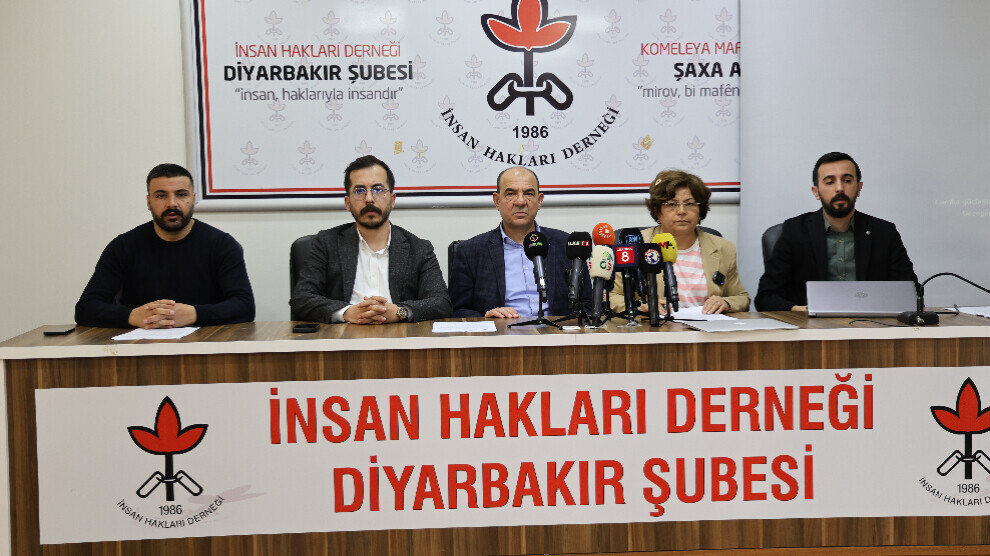IHD: There are 1,412 ill prisoners, 335 in serious condition
IHD reported that there are at least 1,412 sick prisoners in Turkey's jails, including 335 in serious condition.
IHD reported that there are at least 1,412 sick prisoners in Turkey's jails, including 335 in serious condition.

The Central Prisons Commission of the Human Rights Association (IHD) has released the “Report on Sick Prisoners.” During the press statement held at the Diyarbakır (Amed) Branch of the IHD, Co-Chair Hüseyin Küçükbalaban spoke.
Hüseyin Küçükbalaban stated that the Ministry of Justice refrains from sharing health data regarding sick prisoners and emphasized that the data they presented is both current and significant. He said, “Prisons are among the places where the most severe human rights violations occur in this country. The data we share represents only the visible part of the iceberg.”
Hüseyin Küçükbalaban mentioned the “Call for Peace and a Democratic Society” made by Abdullah Öcalan on February 27 and said: “There are fundamental problems caused by the Kurdish question, there are human rights issues, and there is widespread devastation. The destruction brought about by forty years of war is immense. Mr. Öcalan made a call to address and heal this devastation. Since that day, we, along with the entire public, have been waiting to see what steps the state will take, but so far, we see that the state has not put forward any clear roadmap. Some statements have been made. Last week, a delegation from the Peoples' Equality and Democracy Party (DEM Party) met with the Ministry of Justice. We know that during this meeting, the need to take legal steps toward resolving the Kurdish question was discussed. One of the most urgent legal steps is the immediate release of sick prisoners so that they can access their right to health.
Steps addressing the evacuation of villages, unresolved murders, confronting the past, and guaranteeing the ‘right to hope’ would be important demonstrations of goodwill. The destruction caused by war is so immense that the state must take steps to show goodwill. We hope that the report we are about to announce will serve as a guide for politicians. On this basis, I want to emphasize that the first step toward resolving the Kurdish question must be the release of sick prisoners.
Democracy cannot have conditions. Of course, disarmament is important, ending violence and conflict is important, but the state must take confidence-building steps and halt military operations. As long as violations of the right to life continue, hopes for a solution to the Kurdish question and trust within society will steadily decline. I believe the state is aware of this reality. The Ministry of Justice must take our findings and urgently present a legislative reform package to parliament. This package must include the release of sick prisoners and the guarantee of the ‘right to hope.’”
Nuray Çevirmen, an Executive Board Member of the IHD, and Yusuf Erdoğan, a Member of the Central Prisons Commission of the IHD, presented the report after the press statement. The report included findings on the health problems faced by prisoners, based on information received by the IHD, lawyer-client meetings, letters, applications from families and relatives, and interviews conducted during prison visits. It also recalled the statistics released by the Directorate General of Prisons and Detention Houses, stating that as of April 7, 2025, there are 403,060 detainees and convicts held in 395 open and closed prisons across Turkey. The report categorized the data by gender, legal status, types of illnesses, and the specific prisons where prisoners are held.
There are 1,412 ill prisoners
The report stated that the health conditions of the identified sick prisoners were assessed by physicians. According to the findings, there are at least 1,412 sick prisoners in prisons across Turkey and Kurdistan, including 161 women and 1,251 men. The report further noted: “There are 335 prisoners classified as seriously ill. Among them, 230 are unable to sustain their lives independently, and 105 require constant support. Additionally, 188 prisoners must be under continuous medical supervision due to their illnesses. Although 515 prisoners have been reported to have illnesses, their conditions could not be fully assessed due to a lack of necessary medical details, and no information could be obtained regarding the illnesses of 2 prisoners. Therefore, it was not possible to determine whether the conditions of these 517 prisoners are serious or not.”
The report also outlined that among the prisoners: 230 are unable to live independently, 105 require support, 188 must be continuously monitored, 38 require surgery, 21 need immediate treatment, 34 require diagnosis, 247 must have their illnesses regularly monitored, 8 have orthopedic disabilities, 23 have visual impairments, and 2 have hearing impairments.
In the following sections of the report, detailed distributions were provided regarding the conditions of prisoners suffering from cancer, heart disease, Wernicke-Korsakoff syndrome, muscular diseases, memory-related diseases, mental health disorders, tuberculosis, chronic obstructive pulmonary disease (COPD), diabetes, kidney and urinary system diseases, liver diseases, orthopedic problems, visual impairments, and hearing impairments.